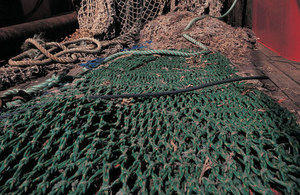New Common Fisheries Policy deal ends discards
A new Common Fisheries Policy (CFP) was agreed by the EU Parliament today and will come into force on 1 January 2014. The new CFP will radically transform fishing practices in Europe.

An historic deal to reform the broken Common Fisheries Policy (CFP) has today been agreed by the EU Parliament and will become law on 1 January 2014.
The final deal follows more than three years of difficult negotiations, in which the UK took the lead to secure significant reform of the fundamentally flawed current CFP.
The new Common Fisheries Policy will radically transform fishing practices in Europe. Reforms include:
- A ban on the wasteful practice of discarding perfectly edible fish
- A legally binding commitment to fishing at sustainable levels
- Decentralised decision making, allowing Member States to agree the measures appropriate to their fisheries
Fisheries Minister George Eustice said:
The long fight to reform the broken Common Fisheries Policy and end the shameful practice of perfectly good fish being thrown dead back into the sea has been won.
Today’s vote signifies a new chapter for the CFP that will make fishing more sustainable, will end the centralised one-size-fits-all approach to decision making and will make discards a thing of the past.
Throughout the negotiations the government fought for a commitment to firm dates to ban discards. Now that the reformed CFP has passed its final vote a ban on discarding in ‘pelagic’ fisheries (such as mackerel and herring) will take effect on 1 January 2015 with a further ban on discards in other fisheries starting from 1 Jan 2016.
The new laws will also allow countries to work together regionally to implement measures appropriate to their own fisheries, rather than be subject to ineffective micro-management from Brussels. This ‘regionalisation’ process has been a top negotiating priority for the UK government which built support for reforms to replace the over-centralised system that currently hinders progress in our fisheries.
The vote also secures for the first time, a legally binding commitment to fishing at sustainable levels. This will ensure annual quotas will be underpinned by scientific advice, to achieve healthy fish stocks and a prosperous fishing industry. This commitment and the ‘regionalisation’ process will both come into force from 1 January 2014. The UK’s priorities for a number of stocks at next week’s EU Fisheries Council will be strongly influenced by the forthcoming legal commitment to fish sustainably, as well as ending wasteful discarding.
Mr Eustice added:
This vote marks a significant milestone and is a testament to the hard work that went into securing the much needed reform of a broken policy.
But our work is not over. We will continue to work with fishermen to help them adjust to the new reforms so that the transition is as smooth as possible.
Next week I will be representing the UK at the EU Fisheries Council. Here I will continue to ensure the UK leads the way in supporting environmentally and economically sustainable fisheries, in line with the reformed CFP coming into force in January.